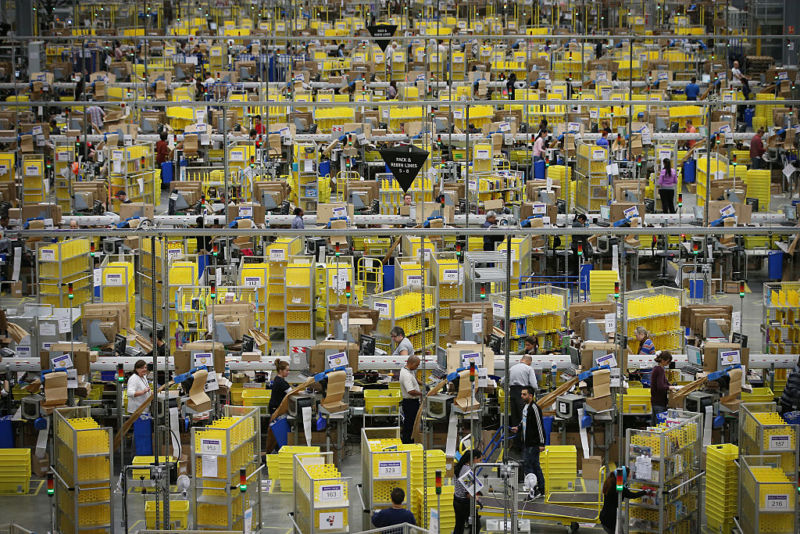
Amazon workers employed at a major warehouse in Scotland to help out during the Christmas rush have reportedly been camping out nearby.
According to an investigation by local newspaper The Courier, "at least three" tents have been spotted in the "bitterly cold" wilderness near Amazon's huge fulfilment centre near the town of Dunfermline in Fife. One worker, who did not wish to be named, described Amazon as a "poor employer," while local activists have described conditions in which employees are forced to work 60 hours a week with minimal breaks for just a shade over the minimum wage.
What's worse, warehouse staff, most of whom are working on a temporary basis to help cover the yearly glut of Christmas orders, are forced by the agency they work for to allegedly pay £10 per day to take specially arranged buses to work—costing them roughly one seventh of their daily after-tax pay, effectively bringing it below the UK's minimum wage of £7.20 per hour.
"Amazon should be ashamed that they pay their workers so little that they have to camp out in the dead of winter to make ends meet," Scotland's Liberal Democrat leader Willie Rennie told the Courier.
Amazon need to take a long, hard look at themselves and change their ways. They pay a small amount of tax and received millions of the pounds from the SNP government so the least they should do is pay the proper living wage.
The fares the company charge for transport swallow up a lot of the weekly wage which is forcing people to seek ever more desperate ways of making work pay.
The online retailer's general manager at the Fife facility, Paul Ashraf, told the newspaper that Amazon "associates" have a "very intense time" doing peak shopping days. He used Black Friday as a recent example, adding: "We had DJs on every floor on Black Friday, we had tombolas, we had raffles that people get free entry into—it’s all about keeping associates safe and having fun."
Amazon's giant Scottish depot has been dogged by persistent rumours of poor conditions, and in a separate investigation, an undercover reporter sent by the Sunday Times to do a few shifts at the Dunfermline site uncovered a miserable working environment.
The reporter—who was told to sign a form opting her out of the European Union working time directive if she wanted a job covering more than 48 hours per week—was paid £7.35 per hour as a "temporary warehouse operative." A figure that is just a few pennies above the national minimum wage, but does not account for the high daily cost of the bus, which is considerably more than the price of a local weekly bus pass.
Amazon, however, insisted to Ars that "we pay competitive wages," adding that the it rises from £7.35 to "£11 an hour and above for overtime."
The company also claimed it provided a "safe and positive workplace with competitive pay and benefits from day one," adding:
As with nearly all companies we expect a certain level of performance from our associates. Productivity targets are set objectively, based on previous performance levels achieved by our workforce. We support people who are not performing to the levels expected with dedicated coaching to help them improve.
The Times reporter, who worked for PMP Recruitment, one of two agencies contracted by Amazon to provide staff for its facility, walked more than 10 miles per day while retrieving items across several floors of the enormous warehouse. She was afforded the statutory minimum of 30 minutes unpaid at lunch, and two paid 15-minute breaks. Despite the enormous distances pickers are expected to travel, the water dispensers "were regularly empty."
Amazon, when quizzed by Ars, claimed that "water is readily available to our people while performing their duties." It added that any associate working a 10-hour shift is given "one hour of breaks." Amazon also said in response to the intensive working conditions: "Some roles involve walking a number of miles each day, a fact we make clear during the recruitment process."
Workers who called in sick accumulated points, at a rate of one per day, even if they had a note from a doctor, according to the Times. Its undercover reporter was told that more than one point would result in a talking-to, and between four and six could result in disciplinary meetings or even the sack; being 30 seconds late earned a half-point penalty. Failing to hit exacting productivity targets, or making too many errors, could also result in accruing these penalty points.
The retail giant didn't rebuff its strict policy, however, saying simply: "We support people who are not performing to the levels expected with dedicated coaching to help them improve."
Amazon has a poor worldwide reputation for staff relations, and its US warehouse network has repeatedly been the subject of investigations into terrible conditions and low pay over the years during its run-up to busy Christmas periods.
Rennie said that the latest coverage "chimes with the feedback I have received from local people over a long period of time." He added: "It confirms that Amazon have created intolerable working conditions for many."
Listing image by Peter Macdiarmid/Getty Images
reader comments
155